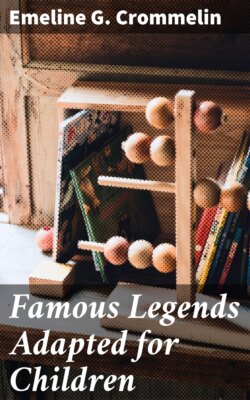Читать книгу Famous Legends Adapted for Children - Emeline G. Crommelin - Страница 5
На сайте Литреса книга снята с продажи.
II. MAID MARIAN
ОглавлениеTable of Contents
If you have heard of Robin Hood, you have heard also of Maid Marian, the fair Saxon maid, whom every one loved. She, too, loved the beauty and freedom of the wild woods—the birds, the flowers, and the streams. It was amid such scenes that she had lived, from the time she was a child. She had learned from her mother how to dress wounds, and she knew a great deal about the herbs in the forest which had been her school.
Maid Marian was often mistress of the sports in her woodland home. Indeed, she handled the bow with such skill that she could shoot a running deer or flying bird, and thought it no uncommon feat.
Robin and Marian met often in their beloved Sherwood Forest. Often they took long walks together, when the hunt was over. Often they sat beneath the old oaks that met above their heads. Often Robin sang some old Saxon song to the notes of Marian’s harp. Thus it was that, amid the beauty and the music of the grand old forest, the youth and the maiden grew to love each other. And when deep sorrow came to Marian, no one spoke such gentle words of comfort as Robin.
Marian and her father had not joined in any of the merry times among the hunters since her mother’s death, until the day that was the beginning of a new grief. Their friends welcomed them with great joy, and Marian’s father, who was a minstrel, was asked to sing for the company. Taking the harp from his daughter, the minstrel began an old Saxon war-song, in which he told how the Saxons once owned the beautiful land, and hunted the deer in the vast forest as much as they pleased, till the Normans came and drove them from their cities, and made severe laws for those who lingered near their old homes; and how their unrelenting conquerors still wrought hardships upon them by killing the beasts and birds that filled the forest.
The song closed with words of sorrow for the friends who had been taken away and would never return.
It was in this fashion that the wandering minstrels used to chronicle in song the mighty deeds of friend and foe. Had it not been for them, many of our most delightful stories, which were remembered from father to son, would have been lost. When people knew how to write these tales, the old minstrels were needed no longer.
The last of all the bards was he,
Who sung of Border chivalry;
For, well-a-day their date was fled,
His tuneful brethren all were dead;
And he, neglected and oppress’d,
Wished to be with them, and at rest.
A wandering harper, scorn’d and poor,
He begged his bread from door to door,
And tuned, to please a peasant’s ear,
The harp a king had loved to hear.
Sir Walter Scott—Lay of the Last Minstrel.
Just as Marian’s father finished the last words of his song, an arrow came whizzing through the air, and struck the harp. This was the beginning of an attack by the foresters, in which Marian’s father was killed.
It was not long after this that Robin’s father was slain by one of the foresters, and Robin declared he would have revenge. He knew to whom the arrow belonged, for it was marked with a crown between the feathers. Taking it in his hand, he said:
“I shall never rest until I have found the owner of this arrow, and avenged my father’s death.”
His mother, who was overcome by the loss of her husband, soon followed him, and Marian and Robin were both without father or mother.
